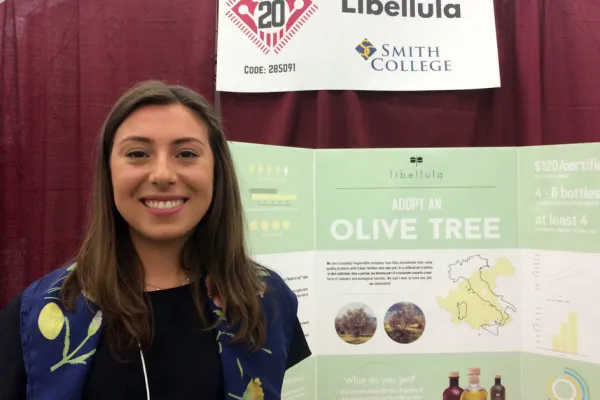Pitching for Success: Smith Hosts Fifth Annual Draper Contest
Events

Published March 31, 2017
Rally your team, listen to your mentors, then “just do it!” That’s the advice past participants in the Draper Competition for Collegiate Women Entrepreneurs offer this year’s contestants.
The fifth annual Draper contest will be held Friday, April 7, from 2:30 to 6 p.m. in Smith’s Indoor Tennis and Track Facility. The event, hosted by the Jill Ker Conway Innovation & Entrepreneurship Center will also include a Trade Show Expo.
Update
April 8, 2017: Smith students took the top two awards in this year’s competition: Emily Morris ’19 won first place for her “ImmunoGo” scientific research idea, and Priscilla Semphere ’18 won second place for her “Ekari” children’s book series.
Sarah Price ’18 and Katie Christensen ’19 won an Audience Favorite award for their “Sanitary Solutions” automated disposal box; and Nouhaila Morredine ’20, Elaona Lemoto ’20 and Anmei Zhi ’20 won Best App for “Rebike,” described as an Uber for bikes.
Launched in 2013 with support from Melissa Parker Draper ’77 and her husband, venture capitalist Tim Draper, the competition offers undergraduate students a chance to pitch new business ventures to a panel of judges. This year, 22 Smith-led teams will be among those competing for the top prize of $10,000 and scholarships to Draper University of Heroes in California.
In 2016, three Smith teams tied for third place in the competition: Yashna Sureka ’17J and Darpan Bohara ’18 (Arpan mail system for Nepal); Julia Franchi Scarselli ’17 (Libellula olive tree adoption); and Aimee Rong ’19 and Tasbiha Chowdhury ’19 (Tutor Town undergraduate tutor-locating service).
Bohara, who is currently studying in London, says “participating in Draper made me realize that there was an entrepreneur within me.”
Here are reflections and advice from other 2016 Draper winners:
From Pitch to Launch
For Julia Franchi Scarselli, the Draper competition was key to making her startup dream a reality. Earlier this month, she launched Libellula, the business she pitched to the 2016 contest judges.
Libellula—which means dragonfly in Italian and is a symbol of purity—supports family olive oil cultivation in the Sabina region north of Rome by offering customers an opportunity to adopt trees.
Franchi Scarselli, who was born in Italy, got the idea for the enterprise while visiting her father, Camillo, who lives in the heart of Sabina. Although she had the passion needed to promote her idea, Franchi Scarselli credits the Draper contest with setting her on the path to formally establishing a business.
“I couldn’t have launched without the support and resources I received during the competition,” says Franchi Scarselli, who is majoring in architecture and in environmental science and policy. “It really opened doors for me.” (A video about her project is available online.)
She received valuable support from mentors referred by the Conway Center, including Smith art professor Barbara Kellum, who is an expert on the visual culture of ancient Rome; Merrilyn Lewis, Smith’s associate director of events management; and Rick Plaut at Valley Venture Mentors. Franchi Scarselli also reached out to Smith’s Department of Art for help with graphic design for her contest posters.
She used her $2,500 Draper prize money to return to Italy last summer, where she formalized her marketing plan for Libellula and created a website for the business. This semester, Franchi Scarselli is taking a data sciences course at Smith, which she says has sparked ideas for improving Libellula’s website with maps and other data about the Sabina region.
Franchi Scarselli—who counts President Kathleen McCartney among Libellula’s first members—will have a booth at this year’s Draper Trade Expo.
“What I’ve learned from Draper, I’m going to take with me when I graduate,” she says. “I went from ‘Oh wouldn’t this be great?’ to having a full fledged business model.”
Lessons from the Shark Tank
Tasbiha Chowhudry and Aimee Rong say they decided to enter last year’s Draper contest almost on a whim.
“We discussed our idea randomly one night in the dining hall,” says Rong. “At one point, Tasbiha had wanted to hire a tutor for her younger sibling but couldn’t find one who was affordable. We realized that there was a need to fill in this obvious gap in the market, and we set out to create a platform specific to college student tutors.”
The Conway Center’s pre-contest Shark Tank tryout ended up being a critical source of feedback on their idea for a tutor-finding service—and a source of inspiration for improving their pitch.
“We didn’t do as well at Shark Tank as we’d expected,” Chowdhury recalls. “Other people had such great pitches. We took notes and left feeling like we could get people excited that way about our idea.”
The two students also received advice from faculty and alumnae mentors referred by the Conway Center.
“They were extremely helpful and eye opening,” Rong says. “We found a community that was supportive and provided us with crucial feedback. So when the big day came, we were prepared.”
Although they have since set aside their Tutor Town website to focus on their studies, Rong and Chowdhury agree that being part of the Draper contest has helped shape their Smith careers.
“It’s been the highlight of my time so far,” says Chowdhury, who is studying engineering and government. “There’s a lot of learning involved, including about yourself.”
“To any student contemplating participating, I would tell them ‘just do it!’” says Rong, who is majoring in economics. “I’ve learned to step outside my comfort zone, ask for help, take risks and, most importantly, have fun.”
Earlier this month, Julia Franchi Scarselli '18 launched Libellula, an enterprise she pitched at the 2016 Draper contest where she tied for third place.